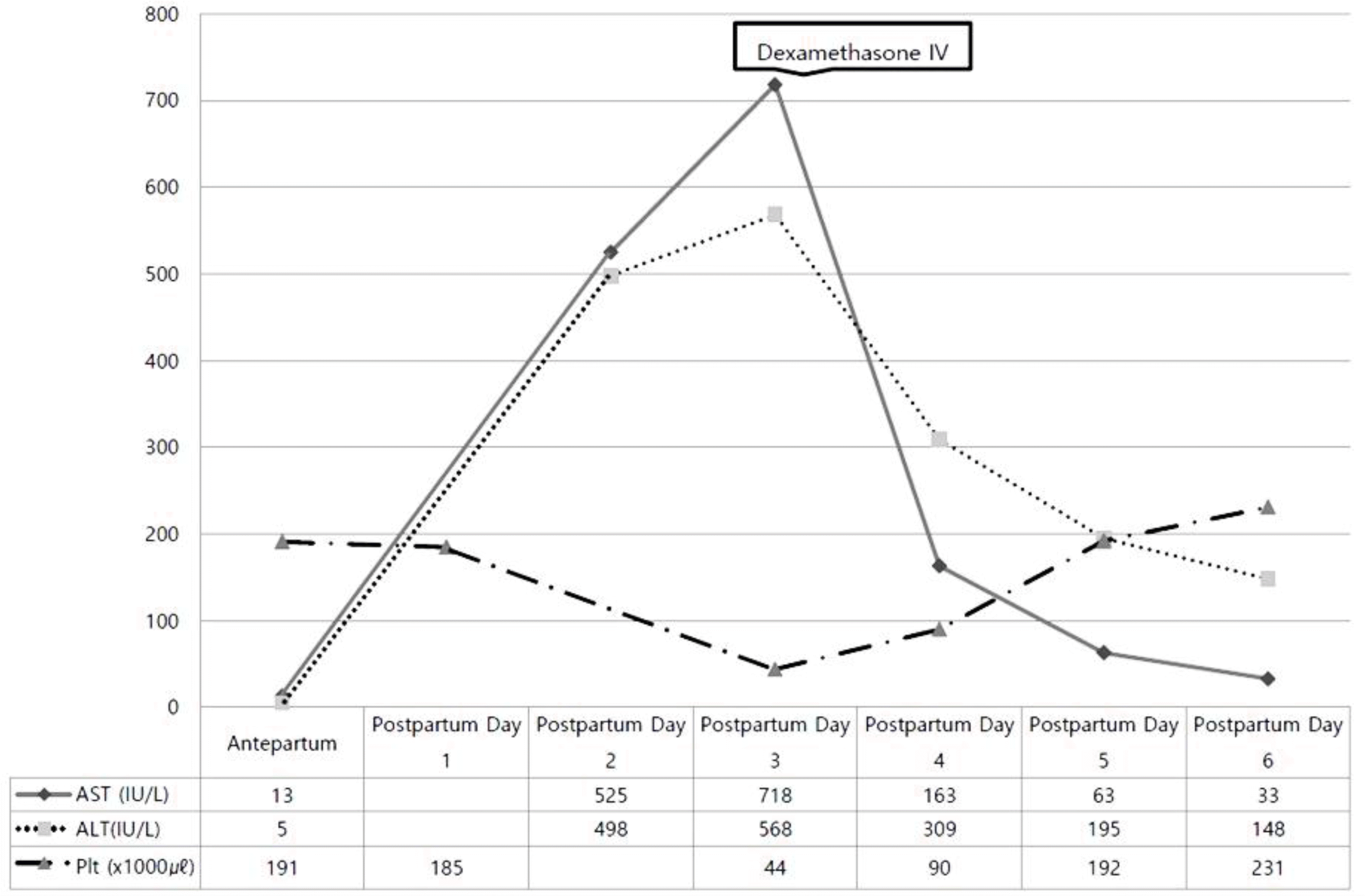Abstract
The treatment of choice for preeclampsia is delivery. However, delivery is not always the end of preeclampsia. We present a case of preeclampsia complicated by postpartum hemolysis, elevated liver enzymes, and low platelets syndrome 30 hours after delivery and treated by high dose steroid. A 34-year-old pregnant woman with severe preeclampsia at 35 weeks of gestation was admitted for close observation. All antenatal laboratory studies performed showed no abnormality. Due to un controlled blood pressure and severe headache, induction of labor was decided and successful vaginal delivery was accomplished. On the second day of postpartum period, upper abdominal pain developed and laboratory studies including liver enzymes and platelets suddenly became abnormal. On the next day, liver enzymes and platelet count were far more aggravated. To stop progression, intravenous dexamethasone (10 mg) was administered at 46 hours postpartum. Liver enzymes and platelet counts recovered immediately after administration of steroid.
Go to : 
REFERENCES
1). Sibai BM., Ramadan MK., Usta I., Salama M., Mercer BM., Friedman SA. Maternal morbidity and mortality in 442 pregnancies with hemolysis, elevated liver enzymes, and low platelets (HELLP syndrome). Am J Obstet Gynecol. 1993. 169:1000–6.

2). Miranda ML., Vallejo-Vaz AJ., Cerrillo L., Marenco ML., Villar J., Stiefel P. The HELLP syndrome (hemolysis, elevated liver enzymes and low platelets): clinical characteristics and maternal-fetal outcome in 172 patients. Pregnancy Hypertens. 2011. 1:164–9.

3). Haram K., Svendsen E., Abildgaard U. The HELLP syndrome: clinical issues and management. A review. BMC Pregnancy Childbirth. 2009. 9:8.

4). Abraham KA., Connolly G., Farrell J., Walshe JJ. The HELLP syndrome, a prospective study. Ren Fail. 2001. 23:705–13.

5). Selçuk NY., Odabas AR., Cetinkaya R., Tonbul HZ., San A. Outcome of pregnancies with HELLP syndrome complicated by acute renal failure (1989-1999). Ren Fail. 2000. 22:319–27.

6). Magann EF., Martin JN Jr. Twelve steps to optimal management of HELLP syndrome. Clin Obstet Gynecol. 1999. 42:532–50.

7). Katz L., Amorim M., Souza JP., Haddad SM., Cecatti JG. COHELLP Study Group. COHELLP: collaborative randomized controlled trial on corticosteroids in HELLP syndrome. Reprud Health. 2013. : 10:28.

8). Cakmak B., Toprak M., Nacar MC., Karatas A. Late postpartum HELLP syndrome 60 hours after delivery associated with mild preeclampsia. J Clin Diagn Res. 2013. 7:2998–9.

9). ACOG Committee on Practice Bulletins—Obstetrics. ACOG practice bulletin. Diagnosis and management of preeclampsia and eclampsia. Number 33, January 2002. Obstet Gynecol. 2002. 99:159–67.
10). Gabor M., Drab M., Holoman K. Postpartum corticosteroids in HELLP synd rome - standard to prompt recovery. Bratisl Lek Listy. 2016. 117:418–24.
11). Wallace K., Martin JN Jr., Tam Tam K., Wallukat G., Dechend R., Lamarca B, et al. Seeking the mechanism(s) of action for corticosteroids in HELLP syndrome: SMASH study. Am J Obstet Gynecol. 2013. 208:380. .e1-8.

Go to : 




 PDF
PDF ePub
ePub Citation
Citation Print
Print



 XML Download
XML Download